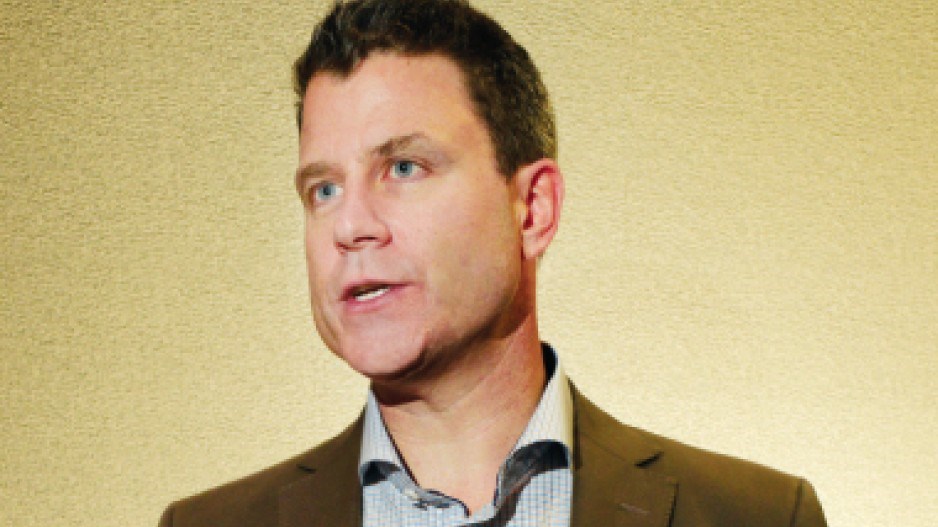When it comes to embracing social media, mobile devices, e-commerce and other technology, Canadian consumers are among the most highly connected in the world, Chris O'Neill, managing director for Google Canada, told members of the Vancouver Board of Trade last week.
Canadian businesses? Not so much. Following his address to the board of trade, O'Neill sat down with Business in Vancouver to talk about Google, business strategy and quantum computing.
Q: Google and NASA recently partnered to acquire a quantum computer from Burnaby's D-Wave Systems Inc. Can you talk about the computer and what Google plans to use it for?
A: I can't speak to the specifics because I simply don't know that. But what little I know about quantum computing – and what D-Wave is onto – is that it's a potentially massively disruptive technology, and probably one of the top 10, in terms of its potential to really, really change the way in which computing happens – orders of magnitude faster. It's early days of a very exciting technology.
Q: You said Canadian consumers are swift adopters of new technology, but Canadian businesses aren't. Why do you think this is and what are the consequences for Canadian businesses?
A: Canadians own the podium when it comes to embracing new technologies – our businesses do not. They lag behind and are at risk of being left behind. On the business side, you think of the percentage of businesses that actually have a website, and it's less than 50%. Not having a website's like not having a phone in your business today. Think of e-commerce and how badly far behind we are in e-commerce. A lot of our national retailers are only getting around to building out thriving e-commerce businesses now. I'd say we're three to five years behind the U.S. A lot of people sit back and say digital, e-commerce is this interesting little thing on the side that is isolated from our core business, when the truth is the opposite. Digital is a key part of bringing people into an actual physical retail store – it's not just about e-commerce.
Q: Your advice to companies with new digital products was interesting. You said don't wait until it's perfect before you launch – you can always update it. Don't you risk making a bad first impression if you launch an app or service that is buggy?
A: The ability to make improvements with rapid release cycles is exactly how the most innovative companies do things. That's how we do things. When you release something every three, four or five, six weeks, it doesn't take long before you make radical improvements. Stacked against the risk of missing out, it's a no-brainer for me.
Q: Microsoft, Mozilla, Salesforce, Amazon and Facebook have all set up development offices here in Vancouver to capitalize on our talent pool. Google has 400 employees in Canada, most of them in Waterloo and Toronto. Why isn't Google here?
A: The reason those folks are here is well understood: there is world-class talent here, great access to quality of life, proximity to Asia, the U.S. and Silicon Valley. That's not lost on me – it's not lost on us. I don't have plans to announce, in terms of us coming to Vancouver. We're very busy scaling up our operations (in Eastern Canada). When the time comes, we'll be the first to let you know.
Q: Google is now – among other things – an Internet service provider. Google fibre is being rolled out in three American cities and you just launched blimps in Africa to provide Wi-Fi. This suggests telecoms, cable companies and Internet service providers are not keeping pace with the demand for better broadband.
A: I can certainly say that's true in the U.S. If you look at the percentage of broadband availability [in the U.S.], it's embarrassingly low – one. Two, it's embarrassingly slow, and – three – it's embarrassingly expensive. There's no reason the Internet hasn't materially improved in terms of speed or performance or cost.
Q: Any plans to bring Google fibre to Canadian cities?
A: The [waiting] list is very long. Who doesn't want Internet that's 100 times faster for roughly the same price? There's no plans in Canada related to fibre. Broadband penetration in this country is among the highest in the world, and it's a major asset.
Q: Businesses that use social media tend to use Twitter, Facebook and LinkedIn, but have been slower to embrace Google Plus. Why should they consider adding yet another channel to their social media strategy?
A: We have more active users on Google Plus than on Twitter. Google Plus is the social backbone of all of Google services. When people go into Google and search for your brand, having a Google Plus page gives you access to all sorts of different ad formats that just don't exist if you're not there. Up to 10 people can video-conference at the same time [in Google Hangouts], and the quality and lack of latency is astounding.
Q: Google would like everyone to work in the cloud. What are the benefits for business?
A: In Silicon Valley, in the startup community, 97% of startups in the valley today use Google cloud-based technologies. Instead of having servers and software on each computer, it's radically more cost effective. More important is the ability to collaborate. If you're a computer programmer, you can rent computer power from Google and not worry about buying expensive equipment. If you have a peak business, you have to build up to that peak. With cloud computing you don't have to build to that peak.
Q: What kind of smartphone does the head of Google Canada use?
A: I'm rocking the LG Nexus 4, and it's amazing. I have a couple of different phones but this is my latest and greatest. •




